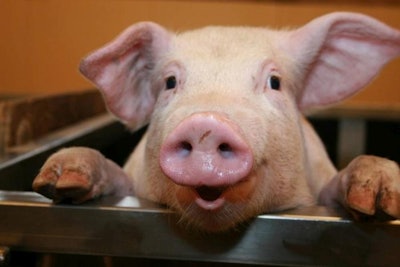
Cutting castration in favor of a novel alternative can significantly boost pig performance and meat quality, while also reducing welfare and behavioral concerns, experts say.
Boar taint is an unpleasant odor that can develop when cooking meat from sexually mature male pigs. To prevent boar taint, male pigs have traditionally been physically castrated (PC), but consumer-driven concerns in some markets about animal welfare have prompted some producers to seek alternative methods.
One alternative, sometimes referred to as immunocastration or boar-taint vaccination, involves administering an immunological (vaccine-like) product that stimulates pigs’ immune systems to temporarily block testicular function and inhibit accumulation of androstenone and skatole, the naturally occurring compounds that cause boar taint.
Speaking at a symposium sponsored by Zoetis at the 2016 International Pig Veterinary Society meeting in Dublin, Steve Pollmann, PhD, of DSP Consulting LLC, said this approach has tremendous potential to improve productivity.
In the first 12 trials, use of the immunological product resulted in average improvements of 4.3% in daily gain and 8.4% in FCR compared to PC pigs fed the same diet and feed program, Pollmann reported.
Developed to reduce boar taint, the immunological product also has pig-welfare benefits, according to John Mackinnon, a veterinarian with the Pig Health & Production Consultancy in association with Oakwood Veterinary Group in the UK.
Speaking at the same event, he explained that one of the UK Farm Animal Welfare Council’s “Five Freedoms” is freedom from pain, injury and disease.
A first and obvious advantage of the vaccination is an end to the need for physical castration, which Mackinnon says is stressful and painful to the animal both during and after the procedure and has been shown to increase risk of infections.
Read more about the benefits of a novel castration alternative.
















